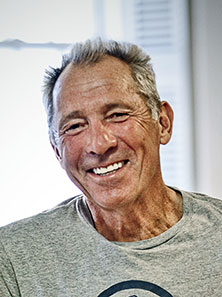 Playwright Israel Horovitz This is Horovitz's introductory essay in the Samuel French edition of "Lebensraum", written in 1997 shortly after the play was first produced, in which he details the circumstances which propelled him to write the play. A few years ago, my German play-agent reprimanded me, quite sternly, saying that I’d repeatedly rejected invitations to visit productions of my plays in Germany. He pointed out that my plays were getting quite popular in Germany, but that I was doing nothing to help him. Simply said, people knew my plays but didn’t know me. I was actually quite surprised. I hadn’t realized that I’d turned down any invitations to visit Germany at all … well, maybe a few … And then, I added it up. In recent years, by my own calculations, I’d found reasons not to visit Germany some fifteen times. In fact, I’d never seen a play of mine in German language. Never. Never isn’t a lot. I though it through, starting from when I was a 5-year-old, in my bed at night in Wakefield, Massachusetts, thinking that the Nazis would be soon coming through my window to kill me and my family. But, that was 53 years ago. A few things have changed, since then. So, okay, I accepted my agent’s proposition for a whirlwind visit to some then-current German productions of my plays, and to some German theatres considering my plays, and to a couple of my German translators. My first stop would be Bonn, for an important production of “Park Your Car In Harvard Yard.” And then, Cologne, where I would see an old friend (pen-pal variety) at WDR (Westdeutchen Rundfunk), a radio network that’s done my plays over the past 25+ years. And then Frankfurt, Hamburg, Berlin… In Bonn, first station of my particular cross, I had a drink with my play’s producer, who told me that there would be a press-conference after that night’s performance. Using a quickly-bought dictionary, I prepared a small speech, in German, saying how happy I was to be in Bonn, etc, etc. As I watched the performance, which struck me as being excellent, I wondered that the reaction would be to the lead-character’s speech about being a Yankee-Jew. I didn’t sit with held breath, I just wondered. In fact, the speech never got spoken. (At least, I think it didn’t get spoken. I don’t speak German. It’s a language that’s always seemed to me to be rather comical, so many fahrt-words … I’ve always imagined Germans standing around on street corners, laughing about how funny they sound.) Anyway, after the show, which got a strong and positive audience response, I stood with the actress, waiting for our press-conference to begin. Making friendly conversation (I thought), I asked her, cautiously (I thought)… “Did the old man ever make his speech about being a Yankee-Jew?” … Her answer took my life around a corner I didn’t even know was there … “Oh, no!” she said. “You can’t have Jews on stage in Germany. It doesn’t smell good.” Smell good? Smell good? Before I could start to talk this out with her, the press-conference began. I was introduced in glowing terms. I re-pocketed my little speech and in English (the language of International Business, which most everyone seems to speak in Germany), I said … “Being in your country – hearing your language being spoken – is an act of heroism for me. It brings me back to when I was five years old, in Wakefield, Massachusetts, lying in my bed at night, thinking the Nazis were about to come through my window to kill me and my family…” Needless to say, there have been more popular speeches made in Germany, before and after mine. The next day, in Cologne, still extremely angry, I told the story to my WDR-friend, Angela, who was amazed, but smiled, knowingly, as if she had the answer that would calm me … “The actress probably doesn’t speak English very well. It was a problem of language, that’s all… the actress was trying to say was that a Jewish character on stage sends a German audience into thinking the play is about the Holocaust. And your play is not about the Holocaust. It would have confused them.” This was not calming news. In Berlin, a few days later, I stayed at the apartment of one of my German translators, Miriam Mueller. Miriam is the daughter of a highly-regarded German playwright, Harald Mueller (“Totenfloss”, “Stille Nacht”). Arnaud, her live-in boyfriend (now live-in husband), is French. Miriam speaks English. I speak English and French. We could all talk about this thing that happened to me … First off, Miriam told me that, growing up, she “didn’t have any casual Jewish friends, whatsoever”, meaning no Jewish school-chums, mo Jewish neighborhood kids. Why? “There were none. They were dead.” In fact, Miriam told me that she didn’t have any Jewish friends at all until she was in her twenties and went to translation school in London. And Arnaud talked about the guilt that young German people feel concerning what their parents and grandparents did more than 50 years ago … and about the unthinkable pain young Germans have inherited … The German legacy… We three stayed up most of the night, talking. I never slept. At 6 a.m., sleep-deprived, I left the apartment and took my morning run in the Charlottenberg Shlosspark, around the castle. I was obsessed by all this … by Miriam never having a Jewish friend … by Jews being unknown, abstract, even to sophisticated people like the children of successful playwrights … and by what Arnaud had said about the profound guilt Miriam and her young German friends feel, forced on them by parents and/or grandparents … (Miriam told me she’d been given a name thought to be Jewish, because “My parents wanted to replace a dead Jewish child”)… As I ran, I thought to myself, “If Jews are totally abstract and are causing young Germans so much guilt, it’s only a matter of time before young Germans say to themselves “These abstract Jews are a major pain in the ass to me!” … and here we go, again!”… And then, out of the sky and into my head came the first image of my play “Lebensraum” … Germany’s Chancellor wakes from a nightmare and calls a press conference that he promises will contain “the news of the Century”. In front of politicians, citizens, reporters, radio microphones, television cameras, he speaks the following words to Germany: “We face the start of a new millennium … a new beginning. As Chancellor of this great German republic, I extend an invitation to six million Jews from anywhere in the world to come to live their lives in Germany. I speak to you now: You will be given citizenship and full privileges in this great nation. You will be German. It is my heartfelt desire to re-establish a Jewish community in Germany, and to reduce, as much as humanly possible, the immeasurable shame we Germans feel each day of our lives for what this country did to our German-Jewish neighbors, 60 years ago. What I’m saying to you six million Jewish people is quite simple, really. Please, come home, please.” As soon as I had the idea, I felt faint. I stopped running and grabbed hold of a bench, next to a small, rectangular trashcan upon which a Nazi swastika had been hand-drawn by magic-marker. I was weak, sweating. Suddenly, a pack of unattended dogs rushed past me, barking ferociously. At first, I thought I would die of fright. And then, I actually laughed aloud … It was all so shabbily theatrical. I ran back to Miriam’s apartment and begun to write my ideas into my notebook. When Miriam and Arnaud woke, I told them my plan for the new play … and that I might call it “Lebensraum” … “Living Space” … Hitler’s initial promise to the German nation when he first set out to conquer the world. Miriam and Arnaud were instantly supportive. I wrote the first draft of “Lebensraum”, obsessively. I had been in the midst of writing a new play, “My Old Lady”. I stopped work on that play … and on the screenplay I was writing for the recent movie based on my play “North Shore Fish”. In fact, I stopped almost everything in my life but for the writing of “Lebensraum”. I read 15-20 new pages a week to the other playwrights of The New York Playwright Lab. I only half-listened to their criticism. In Sylvia Plath-speak, I was “seized by a savage God”. I gave the play an odd, theatrical form, calling for three actors to play some eighty characters. I felt that any play dramatizing Jews, Germans, the Holocaust, at this point in history, needed a fresh approach, both formally and substantially. Without realizing it at the time, I called for three actors who fit the description of the main actors of the Hercub Company, with whom I have been working successfully during the past six years in France. It is they who are doing the European Premiere of “Lebensraum”, at this moment, at Festival d’Avignon, in a translation they’ve created with my young friend Charlotte Vuarnesson. “Lebensraum” opened at Théâtre du Balcon, in Avignon, a week ago, to a packed house. I’m told there is a standing ovation, each night. The World Premiere of “Lebensraum”, was given, of course, at my own theatre, Gloucester Stage, in tandem with my other new play, “My Old Lady”. Both plays brought tearful audiences to their feet … “My Old Lady” (“Meine Alte Dame”) will have its European premiere in Dortmund, Germany, in September; and the Gloucester Stage production of “Lebensraum”, under Richard McElvain’s inventive direction, will re-open in NYC at the Miranda Theatre in October. Several productions of “Lebensraum” are planned for Germany during the next few seasons. For what it’s worth, I am certain that at age 57, I somehow wrote my best work (thusfar) … 30 years after “The Indian Wants The Bronx”, “It’s Called The Sugar Plum”, “Line” and “Rats” opened, one after the other, in my incredible “First Season” as a produced playwright in New York City. But, in the end, it is quite difficult to comment intelligently on one’s own work … ie; what’s important work, what’s not important work. Such self-assessment feels wrong … absurd … like a snail explaining its shell … except to say that it does often seem to me that all of life exists as preparation for the next day. All past is prologue. Such is the nature and condition of Hope. And, in the end, one cannot possibly have the fullest life without dreaming it, first. But if we allow ourselves the dream, yes, oh, yes, all things are possible. I.H., Gloucester, Mass., Summer, 1997
0 Comments
|
AuthorThe Hub Theatre Company of Boston is a professional non-profit performing arts organization dedicated to lowering the barriers between audience and the arts. ArchivesCategories
All
|

 RSS Feed
RSS Feed